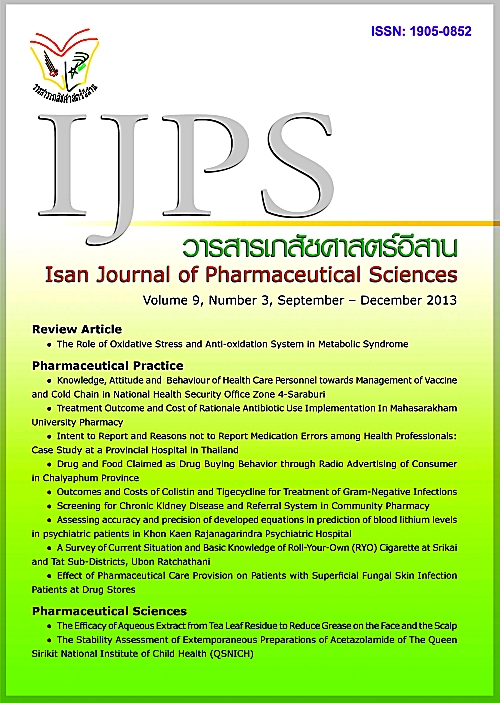Screening for Chronic Kidney Disease and Referral System in Community Pharmacy
Main Article Content
Abstract
Introduction: Chronic kidney disease is a chronic health problem, that early screening among patients is required to avoid the prognosis of the disease. Methods: This survey descriptive study aim toscreen and refer person who has risks for chronic kidney disease in community pharmacy. Selected persons with age40 years or over, and non- chronic kidney disease were referred from community pharmacy to Samakkhi and Burapha health center. All cases were screened by the questionnaire KIDs and proteinuria screening between 25 October and 25 December 2010. There were 214 participants with score 7 or higher and proteinuria, scored 7 or higher without proteinuria, scored 0–6 points with proteinuria, hematuria or a history of kidney stone. Those werereferred to health center then measured serum creatinine (SCr) and calculated glomerular filtration rate (GFR) to evaluate renal function. Results: 42 of 83 attendants (38.8%), who have risks for chronic kidney disease, were referred and measured serum creatinine., Mean SCr is 0.99±0.29 mg/dL and GFR is 76.66±27.49 mL/min/1.73 m2. 11 persons (26.2%) have GFR, which were e less than 60 mL/min/1.73 m2and 31 persons (74.8%) have GFR, which weremore than 60 mL/min/1.73 m2.. All have risk for chronic kidney disease only in stage 1, 2 and 3. Conclusion: Screening for chronic kidney disease has benefits because it decreased the prognosis of disease and receive appropriate management, therefore encourage screening for chronic kidney disease in community pharmacy.
Article Details
In the case that some parts are used by others The author must Confirm that obtaining permission to use some of the original authors. And must attach evidence That the permission has been included
References
Black C, Sharma P, Scotland G, McCullough K, McGurn D, Robertson L, et al. Early referral strategies for management of people with markers of renal disease: a systematic review of the evidence of clinical effectiveness, cost-effectiveness and economic analysis. Health Technol Assess 2010; 14; 1-185.
Boulware LE, Jaar BG, Tarver-Carr ME, Brancati FL, Powe NR. Screening for proteinuria in US adults: a cost-effectiveness analysis. JAMA 2003; 290(23): 3101-14.
Chaiyakum A , Patanasethanont D, Kerdchantuk P, Sirivongs De. Chronic kidney disease screening by KIDs questionnaire. Poster presentation in the 9th Asian Conference on Clinical Pharmacy 26-28 September 2009, COEX, Seoul, Korea.
K/DOQI Clinical Practice Guidelines for Chronic Kidney Disease: Evaluation, Classification, and Stratification. Am J Kidney Dis 2002; 39(suppl 2): S1-246.
Kerdchantuk C. Appropriate screening tool to identify undiagnosed chronic kidney disease in primary care [Ph.D. Thesis in Pharmaceutical Care]. Khon Kaen: Khon Kaen University; 2008.
Khaokhiaw P, Kerdchantuk P, Chaiyasong, S, Srimongkon P and Warorose A. Cost-effectiveness analysis of chronic kidney disease screening by using questionnaires compared with laboratory test in general population without diabetes or hypertension. Naresuan University Journal 2012; Special Issue: 41-50.
Mikkata P, Patanasethanont D, Limwattananon S. Progression and outcomes of chronic kidney disease patients in district hospitals. IJPS 2009; 5; 202-10.
Praditpornsilpa K, ed. Provision of renal replacement therapy in Thailand during the year 2008. Thailand renal replacement therapy 2008; 34-41.
Sirivongs D, Kerdchantuk C, Chaiyakam A, Kessomboon N, Wchakama P. A new self screening questionnaire for people to identify risk for chronic kidney disease top 20%. NDT Plus (2009) 2 (suppl 2): ii1733-. doi: 10.1093/ndtplus/2.s2.24.
Teerawattananon Y, Mugford M, Tangcharoensathien V. Economic evaluation of palliative management versus peritoneal dialysis and hemodialysis for end–stage renal disease: evidence for coverage decisions in Thailand. Value health 2007; 10: 61–72.


